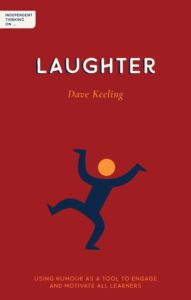Humour, Curiosity and Playfulness – Being 7 All Over Again by Dave Keeling, author, Laughter (Book Excerpt)
 Growing old is compulsory, growing up is optional.
Growing old is compulsory, growing up is optional.
…….Bob Monkhouse
A statistic that is often bandied around regarding laughter states that children laugh up to 300 times a day whereas adults laugh only around 17 times a day. That said, I’ve seen plenty of adults who never laugh, although that might just be the nature of the INSET I was doing at the time. What is it that these kids know that we don’t? Why do they get to have all the fun while we adults slave away day after day without so much as a whiff of a Jelly Baby, star of the week certificate or times-table badge for our troubles? I firmly believe that there is much to be gleaned from copying a child’s approach to life, laughter and learning, and it starts with that wonderful little word – curiosity. Curiosity is the natural inclination to question, challenge and make sense of the world around us. This wonderful quality is inherent in every youngster and comes from a deep-seated desire to understand and be understood. In the words of the 20th-century philosopher Wittgenstein: ‘Humour is not a mood but a way of looking at the world.’
For me, humour is quite simply what you get when you are curious about the world around you in a playful way. Like a 7-year-old. Or me with a firework at parents’ evening. But let me break down that explanation further. Curiosity is one thing. It brings out the philosopher in us, and the scientist. The word ‘curiosity’ has the same Latin root as the word ‘curator’ and it means to look after, to care for, to take care of. But curiosity alone does not produce humour. The manner in which we are curious is critical, too, and it is vital that we approach this curiosity in a playful way. Like a child.
I won’t say I was a slow developer, but our teacher was quite pleased to have someone her own age in the class to talk to. ………Charles ‘Chic’ Murray
A child’s love of nonsense, their desire to engage and explore regardless of who’s watching, their lack of self editing, their propensity for mischief, their capacity for just being in the moment wherever that moment may take them, all of this turns little human beings into wonderfully natural humour monkeys. And I love a humour monkey. So, when was the last time you were genuinely curious about something? If you’re having trouble answering this question, then think about when was the last time you found out something completely new about your partner? Or your kids? Or your best friend? When did you last discover something you never knew before about the place where you live? Where you work? About the subject you teach? And while I have you on my couch, when were you last genuinely and unapologetically playful? When was the last time you got up to some sort of recalcitrant behaviour? When did you last get naughty in your job? And if you’ve never got naughty in your job, if you were to get naughty in your job, what would you do for your first time? Curiosity can prepare the ground for humour, and, in my experience, one of the best and most effective ways to pique a group’s curiosity – and from there change their mood and open them up to the wonderful world of learning for the better – is to do, show or say something that no one expects. Something that will turn their expectations upside down.
Here is a selection from the shelves of my own curiosity shop:
- Have a strange object on your desk.
- Make an intentional mistake.
- Play music they may never have heard before.
- Wear a costume as they come into the room.
- Arrange the room in a different layout (this will pique their curiosity and immediately get them asking questions).
- Have a special guest in the classroom.
- Use food of any description and in any manner.
- Stand on your desk (health and safety decrees you must have a ladder and an ambulance on standby for this one).
- Play with a £50 note (if you haven’t got one, ask someone in reprographics to print you one up – you know they’ll know what to do!).
- Arrive slightly late, make a big entrance and use a word that no one has ever heard of.
Try any of the above – or come up with your own – and prepare to be amazed at how inundated you will be with more inquisitive questions than you can shake a stick at. In fact, shaking a stick at them – there’s another one.
 Dave Keeling
Dave Keeling
Dave Keeling has been a professional actor and ‘stand-up educationalist’ for more than two decades. Whether it’s leading a workshop with challenging teenagers, speaking to a hall-full of equally reluctant teachers or delivering a keynote for school leaders looking for the cure to recalcitrance, Dave never fails to leave delegates happy, moved, less stressed and feeling a great deal more motivated.
Independent Thinking on Laughter
Dave Keeling’s ‘Independent Thinking on Laughter: Using humour as a tool to engage and motivate all learners’ is an uplifting manifesto packed with tips and techniques to help educators unleash the power of humour and laughter in the learning environment. Writing with his trademark wit, Dave shares handy hints acquired from his experience in the world of comedy and offers a veritable smorgasbord of activities for use with learners – all proven to generate laughter, enhance learning and make the teacher look great.
Published by Independent Thinking Press, an imprint of Crown House Publishing.
Available from: https://www.independentthinkingpress.com/books/teachingskills/independent-thinking-on-laughter/.
Tags: dave keeling, havivng a family, laughter, parenting, raising kids, staying young at heart















